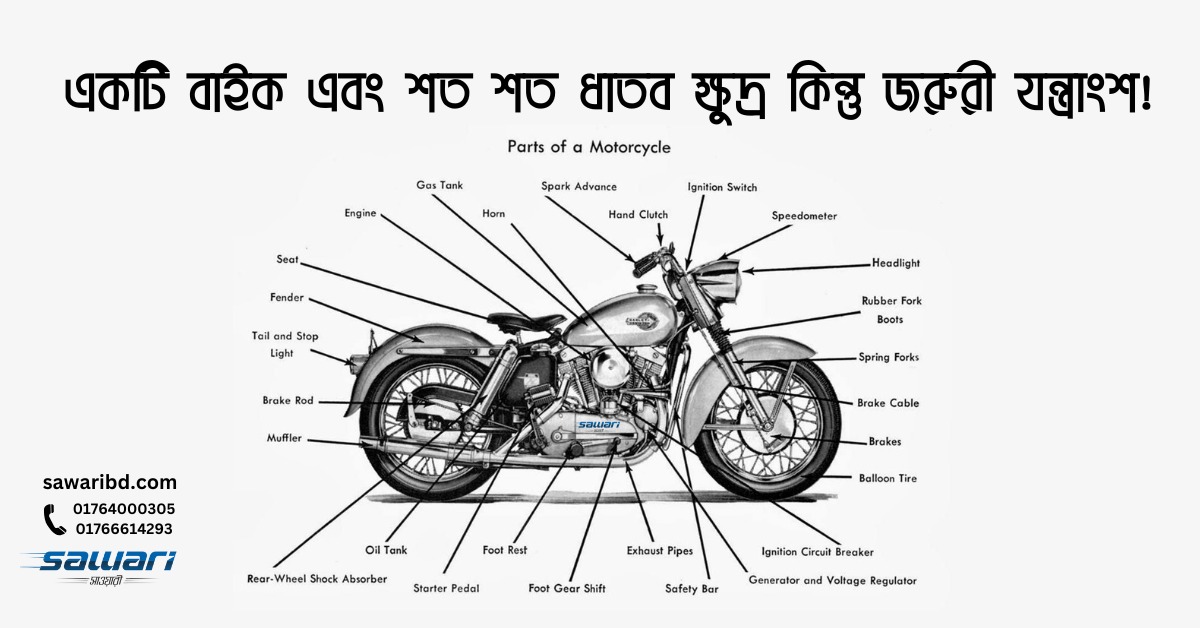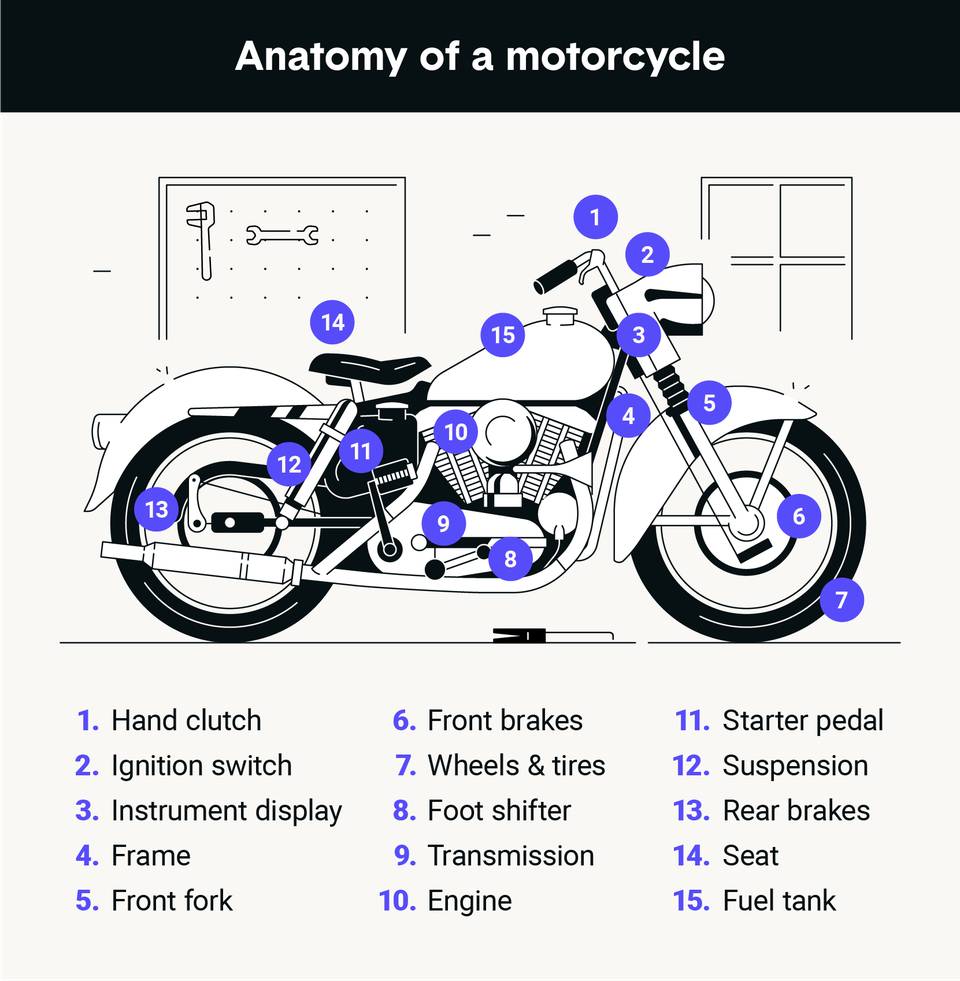A DIY Checklist for Keeping Your Motorcycle Spares Christchurch in Peak Shape
A DIY Checklist for Keeping Your Motorcycle Spares Christchurch in Peak Shape
Blog Article
Discover the Crucial MotorBike Parts You Required for Optimum Efficiency
Understanding the crucial parts of a bike is essential for accomplishing peak performance. Each element, from the engine to the braking system, plays an important function in overall performance and safety. Normal maintenance can avoid unforeseen failures and boost the riding experience. Nevertheless, lots of motorcyclists overlook the intricacies of these systems. Finding just how they work together can bring about an extra effective trip. What vital parts should every rider prioritize?
The Engine: The Heart of Your Motorcycle
The engine works as the core element of a motorbike, driving its performance and specifying its abilities. It is accountable for converting gas into power, which powers the bike onward. Different sorts of engines are utilized, including single-cylinder, V-twin, and inline configurations, each offering unique qualities fit for different riding functions and designs. The engine dimension, typically determined in cubic centimeters (cc), considerably influences performance, with bigger engines normally providing more power and torque.Furthermore, the engine's layout and modern technology, such as fuel shot systems or air-cooling versus liquid-cooling, influence efficiency and dependability. Maintenance is crucial for peak procedure; aspects like regular oil modifications and checking trigger connects assurance long life. Riders commonly consider an engine's responsiveness and smoothness, as these features improve the general riding experience. Eventually, the engine remains a vital component that defines not only the bike's efficiency however also the biker's link to the machine.
The Transmission: Moving Gears Efficiently
The transmission plays a vital function in a motorcycle's efficiency, specifically in the mechanics of equipment changing. Understanding how to shift gears efficiently can enhance the general riding experience, while normal upkeep assurances peak functionality. Appropriate interest to these elements can substantially impact the durability and performance of the motorcycle.

Equipment Shifting Mechanics
Smooth gear changing is essential for ideal motorcycle performance, greatly affecting both acceleration and control. The auto mechanics of equipment moving entail the interaction between the clutch, gear bar, and transmission system. When a biker engages the clutch, it disengages the engine from the transmission, permitting an equipment modification without harming the elements. A well-timed launch of the clutch, incorporated with precise activity of the equipment bar, promotes a seamless change between equipments. This procedure guarantees that the engine operates within its best power band, enhancing performance. Motorcycle Parts Auckland. In addition, comprehending the gear ratios and their result on rate and torque can aid bikers make educated selections during changes, eventually adding to a more responsive and enjoyable riding experience
Upkeep Tips Relevance
Regular upkeep plays a vital role in ensuring that the transmission system operates successfully, permitting smooth equipment shifts. Routinely checking and transforming the transmission fluid is vital, as old fluid can cause raised friction and wear. In addition, checking the clutch for wear warranties peak engagement and disengagement, avoiding slippage during equipment adjustments. Lubrication of moving parts is similarly essential to reduce friction and improve performance. Motorcycle owners ought to also check for leaks and unusual sounds, as these can show underlying problems. By sticking to these maintenance tips, bikers can lengthen the lifespan of their transmission system, ensuring that equipment changes remain seamless and adding to the total performance of their motorbike.
The Braking System: Ensuring Safety on Every Experience
Braking systems are essential elements that straight influence a motorcycle's security and performance. They consist of various parts, including brake pads, blades, calipers, and hydraulic lines, all functioning with each other to assure efficient deceleration. The kind of stopping system-- usually either disc or drum-- influences responsiveness and quiting power.Regular maintenance is important to support peak performance; used brake pads can cause lowered effectiveness and enhanced quiting ranges. In addition, the high quality of brake fluid need to be checked, as it can soak up moisture with time, endangering braking efficiency.Riders need to additionally take into consideration the relevance of anti-lock braking systems (ABDOMINAL MUSCLE), which protect against wheel lockup throughout abrupt quits, improving overall safety and security. Properly operating brakes are not practically quiting; they instill self-confidence in the biker, permitting for safer navigation via various surfaces. Inevitably, a dependable braking system is essential for delighting in every experience with comfort.
The Suspension: Enhancing Convenience and Control
A well-functioning shock absorber substantially contributes to a motorcycle's overall performance, enhancing the effectiveness of the stopping system. The suspension plays a substantial role in soaking up shocks from unequal surface areas, guaranteeing a smoother experience while preserving tire call with the road. This contact is important for both security and control, allowing riders to browse edges with confidence and precision.Different kinds of shock absorber, such as telescopic forks or mono-shocks, use varying degrees of convenience and handling. Correctly tuned suspension enhances responsiveness, supplying the motorcyclist with a find more much more linked feel to the motorcycle. Routine upkeep checks are very important to identify the suspension parts, including dampers and springtimes, are working at their finest. A reliable suspension system not just elevates the riding experience yet likewise adds to the long life of other motorbike components by lessening damage. Because of this, investing in top quality suspension is important for any type of major motorbike fanatic.
The Tires: Attaching You to the Road
Tires play an essential function in a motorcycle's performance, serving as the primary web link between the biker and the roadway. Recognizing the various sorts of tires readily available can significantly impact handling and safety. Furthermore, routine upkeep is important to guarantee peak tire performance and durability.
Tire Keys In Explained
Just how do various tire types affect a motorbike's efficiency? Tire types play a vital function in establishing a motorbike's hold, handling, and stability. Sport tires, made for high efficiency, deal boosted grip and responsiveness on smooth roadways, making them optimal for racing and aggressive riding. Conversely, touring tires prioritize resilience and comfort, supplying a smoother experience for long-distance traveling. Off-road tires, defined by their rugged tread patterns, master traction on unpaved surface areas, ideal for experience lovers. In addition, dual-sport tires mix attributes from both on-road and off-road classifications, dealing with functional riding needs. Inevitably, picking the appropriate tire type is essential for optimizing performance, making sure safety and security, and boosting the overall riding experience.
Upkeep Tips Offered
While riding on the roadway, maintaining suitable tire problem is important for safety and security and performance. On a regular basis inspecting tire stress is very important, as under-inflated tires can lead to inadequate handling and enhanced wear. It is recommended to examine step deepness regularly; used tires concession hold and security. Furthermore, riders should seek indications of damages, such as splits or lumps, which can show the need for replacement. Revolving tires regularly ensures even wear, improving durability. Maintaining tires tidy from particles and preventing too much aesthetics can extend their life-span. Finally, preserving appropriate positioning and balance adds to peak efficiency, minimizing tension on various other bike parts. Abiding by these upkeep pointers will significantly improve the general riding experience.
The Fuel System: Sustaining Performance and Performance
The fuel system plays a vital duty in taking full advantage of a motorcycle's performance and effectiveness, as it guarantees the optimum delivery of fuel to the engine. It consists of several crucial components, consisting of the gas container, fuel pump, fuel filter, and fuel injectors or carburetor. Each component needs to function properly to assure a effective and smooth ride.The fuel storage tank shops gasoline and provides it to the engine using the fuel pump, which produces the needed pressure. A fuel filter protects against contaminants from entering the engine, while the injectors or carburetor mix gas with air for combustion.Proper maintenance of the fuel system is essential; a clogged up filter or malfunctioning injector can cause lowered performance and increased gas intake. By validating that the gas system operates efficiently, bikers can enjoy enhanced throttle feedback, better gas economic climate, and overall boosted riding experience.
The Electrical System: Powering Your Adventure
An efficient electrical system is necessary for the overall capability and safety of a motorcycle, as it powers critical parts such as the ignition, lighting, and various electronic systems. This system includes the battery, which stores power, and the generator, responsible for generating power while the engine runs. The wiring harness attaches these elements, guaranteeing trusted power distribution.Additionally, fuses secure the system from overloads, while relays aid manage high-current devices with low-power signals. A properly maintained electrical system enhances performance by ensuring smooth begins and constant procedure of lights and signals, essential for biker presence and safety.Regular checks of the battery's charge and links are necessary for preventing electrical failures. Bikers need to additionally check wiring for damage, making certain all elements work ideally. Inevitably, a robust electrical system article adds substantially to the general performance and dependability of the motorbike.
Often Asked Inquiries
Exactly how Frequently Should I Change My Bike's Battery?
The frequency of bike battery replacement depends upon use and maintenance (Oem Parts New Zealand). Usually, batteries must be changed every three to 5 years. Routine checks can aid determine when a substitute is necessary for peak efficiency
What Devices Do I Need for Basic Motorcycle Maintenance?
For basic motorbike upkeep, one calls for necessary devices such as an outlet collection, wrenches, screwdrivers, pliers, tire stress scale, and a torque wrench. These tools promote reliable upkeep and assure the motorcycle runs efficiently and safely.
Just How Can I Boost My Motorcycle's Aerodynamics?
To boost motorbike aerodynamics, one must consider adjusting fairings, utilizing windscreen extensions, maximizing body position, and reducing overall weight. These alterations assist minimize drag, boosting security and gas effectiveness throughout adventures.
What Are the Indicators of a Failing Electrical System?
Indications of a stopping working electric system consist of dimming lights, problem Recommended Reading beginning, irregular tool analyses, and blown merges. Motorcycle Spares Christchurch. Unusual smells or rust around battery terminals may also suggest underlying problems requiring instant interest for safety and security and performance

Exactly how Do I Pick the Right Oil for My Bike?
When choosing oil for a motorbike, one ought to consider the supplier's specifications, thickness scores, and the kind of riding. Additionally, synthetic versus traditional oil can impact efficiency and engine defense, affecting the decision significantly. The engine size, usually determined in cubic centimeters (cc), considerably influences performance, with larger engines usually giving even more power and torque.Furthermore, the engine's style and innovation, such as fuel injection systems or air-cooling versus liquid-cooling, impact performance and reliability. A well-functioning suspension system significantly adds to a motorcycle's general efficiency, complementing the performance of the stopping system. The fuel system plays a crucial role in taking full advantage of a motorbike's performance and effectiveness, as it guarantees the optimum distribution of fuel to the engine. A fuel filter prevents impurities from entering the engine, while the injectors or carburetor mix fuel with air for combustion.Proper upkeep of the gas system is essential; a clogged up filter or malfunctioning injector can lead to reduced efficiency and increased gas usage. A properly maintained electrical system improves performance by making certain smooth starts and constant procedure of signals and lights, important for biker visibility and safety.Regular checks of the battery's charge and links are essential for avoiding electrical failures.
Report this page